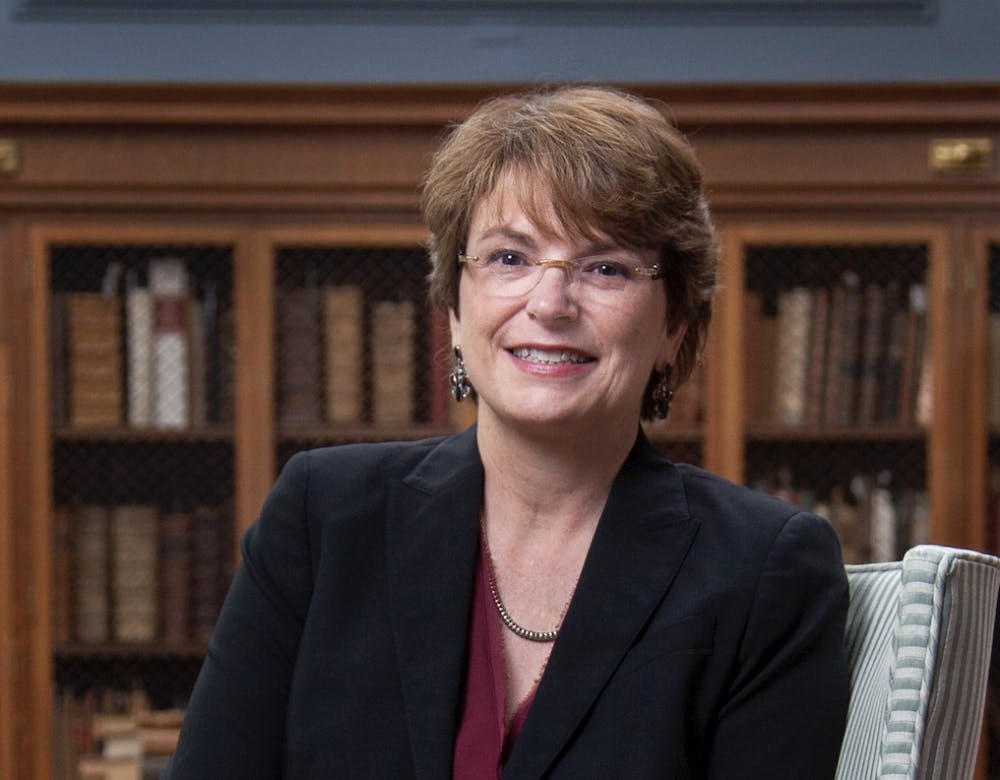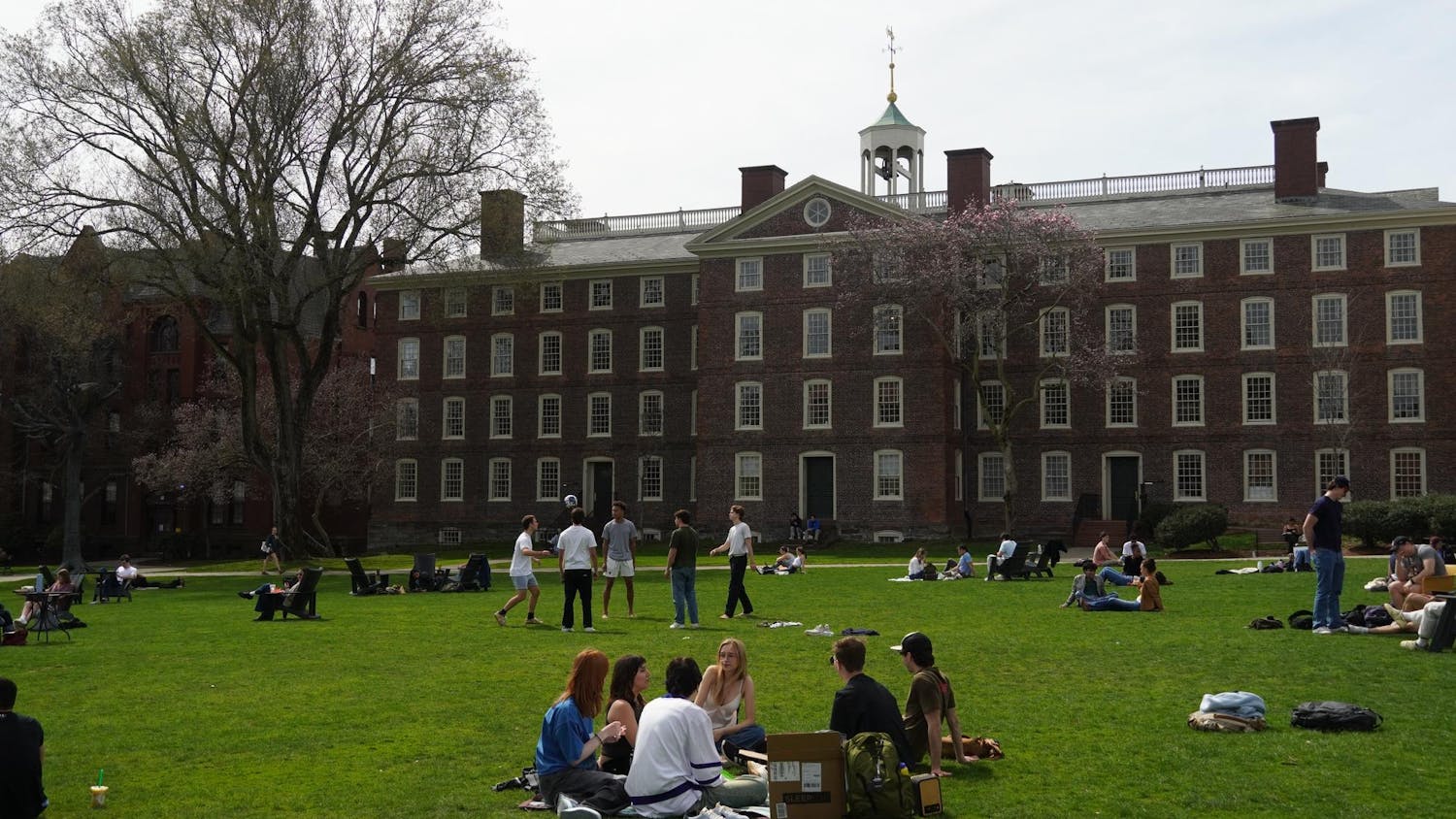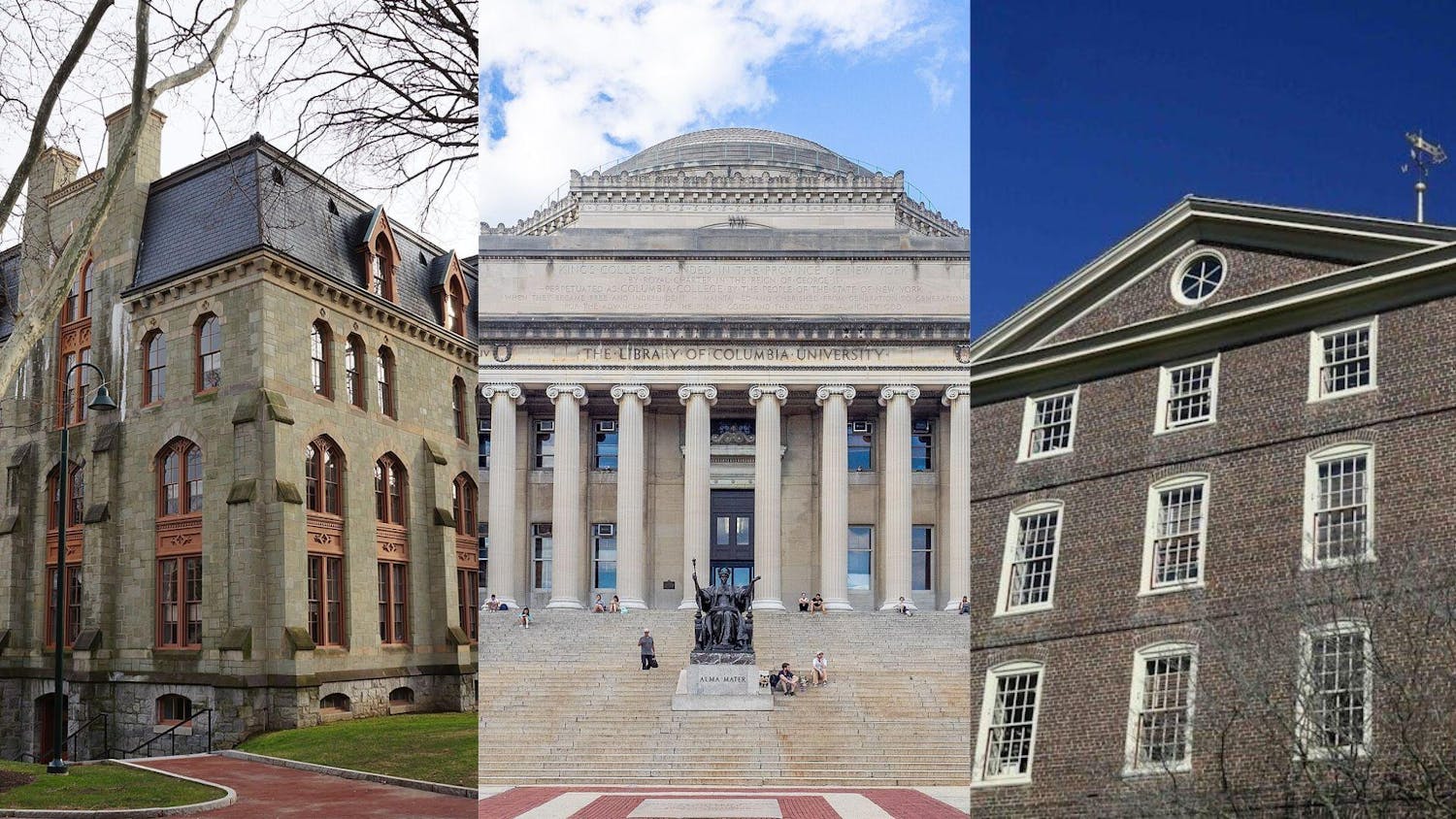Amid student activism responding to the Israel-Palestine war, campuses reconsidering their admissions policies and concerns of academic freedom in the face of political pressure, Brown and other universities face a deluge of difficult decisions with national implications.
In recent months, President Christina Paxson P’19 P’MD’20’s response to these crises has been met with scrutiny from activist groups, students, faculty and staff.
The Herald sat down for an interview with Paxson to discuss her stance on activism, admissions policies and academic freedom on campus.
Paxson would “ask ACURM to fast track” divestment consideration
In early February, 19 students initiated an eight-day hunger strike aimed to compel the Corporation, the University’s highest governing body, to “hear and consider a divestment proposal” at their February meetings.
On the first day of the strike, Paxson refused to heed their demands, instead referring them to the Advisory Committee on University Resource Management to submit a divestment proposal for consideration. She first referred student activists with similar aims of divestment to ACURM in December following a related campus sit-in.
Strike organizers refused to submit a proposal to ACURM, saying that the length of time it would take for consideration is an “untenable timeline given the urgency of the crisis in Gaza.” The students created a “critical edition” of a 2020 report compiled by the Advisory Committee on Corporate Responsibility in Investment Practices — the predecessor of ACURM — that recommended endowment divestment from “companies which profit from human rights abuses in Palestine.”
Paxson previously refused to adhere to the report, saying that the recommendations did not meet the “requisite level of specificity in regard to divestment.”
During the interview, Paxson reiterated her previous position for students to submit an ACURM proposal, and added that if they were to do so, she would “ask ACURM to fast track” the consideration process, but emphasized that she does not control the committee.
Members of the Corporation discussed the recent protests on campus in their February meetings, Paxson wrote in the meeting recap shared with the Brown community on Feb. 12.
When asked to provide more details on the discussions, Paxson noted that while she couldn’t share specifics, she could summarize the Corporation’s views.
“When (Corporation members) look into student activism, they honor it,” Paxson said.
She added that discussions centered on “institutional neutrality” — the idea that “the role of the University is to support the discussion across the broad community,” rather than support a particular viewpoint.
According to Paxson, the critical version of the 2020 ACCRIP proposal, which student protestors handed out to Corporation members as they headed to their Feb. 9 meetings, is “clearly aimed at taking a position.”
“I really feel the urgency that the students are feeling. But in some ways, that urgency underscores or highlights the idea that this action is really about wanting Brown to take a position,” she said. “On very contested issues where there are many different views, we don’t feel it’s appropriate for the University to take sides.”
Paxson has not yet received Ad Hoc Committee on Admissions Policies recommendations
Following the Supreme Court’s June decision to overturn the use of affirmative action in college admissions, Paxson charged an Ad Hoc Committee on Admissions Policies with examining the University’s use of legacy status, early decision and test-optional admission practices.
The group, made up of Corporation members and faculty, was set to make their final recommendations to Paxson and the Corporation by last month, but no final recommendations have been made public.
Paxson told The Herald that the committee’s “final recommendations were not presented at the Corporation meeting” in early February and that she had yet to receive their report.
Previously, the University did not commit to publicly releasing the recommendations when Paxson was to receive them. During the interview, Paxson explained that she will typically share the rationale for policy changes like these.
She also committed to sharing the committee’s recommendations. But she did not commit to releasing the full report, noting that “the committee has been looking at a lot of data that couldn't be shared publicly.”
“The full report is very unlikely to be made public,” Paxson added.
Paxson also said that the committee is “getting pretty close to the end of their discussions” as any policy changes are planned to be announced prior to the start of the next application cycle to ensure applicants “have the best information possible as they make (application) decisions.”
Despite the delay at Brown, other colleges have begun altering their admission policies, with Dartmouth recently reinstating standardized testing requirements.
Prior to the Supreme Court’s June decision, Paxson published a letter in the Brown Alumni Magazine that detailed her views on the advantages and disadvantages of reinstating test policies. In the magazine, she declined to share her views on testing requirements before receiving the committee’s report.
But she did provide some thoughts on legacy preferences in admission, saying that “this is not a high stakes decision” as only 8% of current Brown students are considered legacies. The University classifies legacy students as those with one or more parents who completed an undergraduate degree at Brown.
By continuing to consider such policies, she said it “lets alumni know that we really want their students at Brown” which helps “build a sense of community.”
She also pointed to diversity as a refined element of legacy admissions, saying that with admission policies over the past 30 years affording the University a diverse class of students, “our legacy students are now much more diverse, and they will become increasingly so as time goes on.”
Paxson said if the University “were concerned primarily with socioeconomic diversity, it would make sense to eliminate this practice.”
Paxson discusses arraignment proceedings of sit-in protesters
During two consecutive sit-ins in University Hall calling for the divestment of the University’s endowment from “Israeli military occupation,” 61 students were arrested on charges of trespassing in total.
After the first sit-in in early November, the 20 students arrested were informed that their charges had been dropped in late November — two days after Hisham Awartani ’25 was shot in Burlington, Vermont alongside two other Palestinian students.
Following another sit-in in December, 41 students were arrested on similar charges. The charges remain as all pleaded not guilty during two arraignments last week.
When asked why the first set of charges was dropped but not the second, Paxson said it “had to do with the timing of the shooting of one of our students, which was devastating to the community,” referring to Awartani.
As the scheduled arraignment for the initial 20 protestors “coincided” with the day of the shooting, “it made sense to try to take the level of tension and upsetness down a notch, and that was the reason for dropping the charges,” she added.
“Students in both cases were arrested not because of their political views,” Paxson clarified. “It’s very important to not let protests disrupt the functions of the University or infringe on the rights of others from the University. Occupying University Hall (past operating hours), which has some of the most sensitive information in the University, is simply not something that we can let happen.”
She also compared the sit-in to civil disobedience, stating, “you do things knowing that you will accept the consequences of your actions. And the students were told very clearly what the consequences of their actions would be. So this is a choice on their part, and I respect their choice.”
During both demonstrations, the students were informed several times of the legal consequences of remaining in University Hall past operating hours prior to their arrests.
Paxson reaffirms importance of academic freedom, denies facing “significant” external pressure
In the interview, Paxson remained steadfast in her commitment to protecting academic freedom and free speech on campus, even in the face of heated disagreements.
She hopes that University programming and resources will allow students and staff to “have dialogue across differences” and promote a free exchange of ideas.
She also highlighted the University’s longstanding and unchanged policy on academic freedom, first implemented in 1966 amid the Vietnam War, when Brown saw a surge in student activism that mirrors the current movements.
“Academic freedom is essential to the function of education and to the pursuit of scholarship in universities,” the statement reads. “Therefore, Brown University, mindful of its historic commitment to scholarship and to the free exchange of ideas, affirms that faculty members and students alike shall enjoy full freedom in their teaching, learning and research.”
Reflecting on the recent Congressional hearings and subsequent fallout involving other Ivy League presidents, Paxson noted that “there are valid concerns about the state of academic freedom on university campuses,” but added that she has not faced “significant” external pressure that threatens to compromise Brown’s academic mission.
Correction: A previous version of this article incorrectly stated that Paxson would release the recommendations of the Ad Hoc Committee on Admissions Policies before the University implemented policy changes. Paxson did not specify when she would publicize the recommendations relative to their implementation. The Herald regrets the error.

Owen Dahlkamp is the managing editor of newsroom on The Herald's 135th Editorial Board, overseeing the paper's news operations. Hailing from San Diego, CA, he is concentrating in Political Science and Cognitive Neuroscience with an interest in data analytics. In his free time, you can find him making spreadsheets at Coffee Exchange.

Anisha Kumar is the senior editor of community and standards of The Herald's 135th editorial board. She previously served as a section editor covering University Hall and international student life. She is a junior from Menlo Park, California concentrating in English and Political Science who loves speed-crosswording and rewatching sitcoms.





